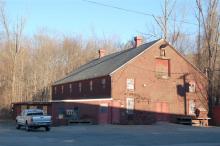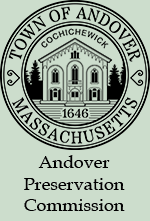Architectural Description:
NRDIS NRMRA, two story structure, wooden, shingled.
Historical Narrative:
Presently used by Redman Card Company - Merrimack Card Clothing.
Themes - Architectural, Community Development and Industry.
As early as 1682 this area of Andover was being offered by the Town Proprietors as a “Mill privilege on the Shawshin, near Roger’s brook” to any inhabitant willing to build a saw mill. In 1753 one half of a saw mill was sold by Humphrey Holt to Asa Abbot and then in 1764 to Nathan Abbot.
Abbott Village was established early in the 1800's with the more than adequate source of water to power the mills. Site originally used by Abraham Marland, who in 1807, erected a cotton mill near the Essex Street stone arch bridge. Abel & Paschal Abbott moved their wool mill operation here from the North Parish about 1815. Abiel Russell was their first foreman and Daniel Saunders leased a portion from 1817-1825. James Howarth established a wool mill 1824-1847, building the stone mill on the east side of the river. The Abbot brothers had a successful business until about 1838 when the market took a down turn. Creditors sold the Abbot Mill buildings to Smith & Dove Co. in 1843.
Smith & Dove Co. produced linen thread and was established in Frye Village (Shawsheen Village) in 1835. The company founders John Smith, Peter Smith and John Dove were all Scottish immigrants from Brechin in County Angus. The company continued operations in both Frye and Abbott Villages gradually relocating all production up river to this location. In 1865 they became the Smith & Dove Manufacturing Co. producing linen thread for shoe laces, carpets and sail cloth. Later operations included broad cloth. Smith & Dove is said to be the first linen production manufacturer in the United States. The company continued to expand operations through the years and by 1894 had completely abandoned the former plants in Frye Village. A new Main Mill plant opened in 1894 in Abbott Village and improvements continued well into the first decade of the 20th century. The old bridge that crossed the river was first located closer to the dam and was removed in 1894 for the construction of the new Main Building on the east side of the river. A new bridge was constructed at that time on the north end of the mill between the new engine and boiler house.
This building has been attributed to the Abbott brother's mill complex and may have been built near the end of their ownership. The frame construction is not post and beam as was typical of that period. The 1852 and 1872 maps of Andover have this site as vacant. The Abbot mill building may have been located where the current brick building is sited on the lot and moved to this location at the time of the new construction. The 1852 map lists a saw mill and a grist mill on that location.
From period photos and maps we find the use of the building when Smith & Dove held ownership as a drying shed and yard. Later it is listed as stock storage which would have been raw flax plants before the hackling process. During the Redman Card Co. ownership the building was listed as cork storage.
The newer brick building on the parcel is listed as the dye and bleach house #18 damping shed #19 “dry shed”– Storehouse #15. The 1901 Sanborn map lists the north end of the building as the bleach house, and the south end as the dye house on the first floor and the dry house on the second floor. on the roof was a wood opened slatted vent enclosure for drying and cooling the linen in the open air.
The Smiths and Dove families were active in community affairs, contributors to educational institutions and helped establish Memorial Hall Library. They were all abolitionists, with John Smith and John Dove charter members of the Free Christian Church, which John Smith established. It would be the second generation of the Smith & Dove families that expanded the Abbott Village mill buildings to meet the needs of the 20th century. Worker housing, a village hall, recreational facilities and a pension fund were all established to help their operatives.
In 1927 the Smith & Dove Co. was sold to the Trustees of the Ludlow Manufacturing Associates of Ludlow, MA. The housing real estate was placed in the Smith & Dove Tenements, Inc. that year, changing the name to Andover Homes, Inc. that then sold off the housing stock to private hands. The company operations were moved to Ludlow, MA and the mill closed in 1928.
The Indian Ridge Co.,Inc. acquired the mill properties and some of the housing stock. Through the company treasurer Virgil D. Harrington the mill buildings were then parceled off sold to private investors.
Herbert W. Keogh purchased the property on Oct. 14, 1940 indentured deed. The North American Holding Corp., Levi S. Chapman pres. and the Parshad Holding Corp. Alfred H. Avery pres. held the property then sold to George A. Campbell on Aug. 25, 1945 also indenture deed.
George A. Campbell then sold to Ruth D. Redman on Oct. 11, 1945. The Redman family have been the owners of the property since that time. The Redman Card Company operated their business here for for 67 years in 2012. After Ruth Redman died the estate went to Frederick C. Redman who placed the property into the Redman Card Clothing Co., Inc. on Mar. 9, 1977. The property was later placed in the
George F. Redman Revocable Trust of April 4, 1991, Geo. Redman trustee on Nov. 7, 2009. Redman sold to Dundee Red Spring LLC on Nov. 30, 2012.
Dundee Red Spring LLC is managed by Ozzy Properties. The new owners of the Abbott Mill building request to demolish the historic structure was received by the Andover Preservation Commission shortly after. The building was voted as Historically Significant and a one year Demolition Delay was voted. The brick Dye and Bleach house building #18 was renovated in 2013. New windows, exterior brick cleaned and pointed. The interior was completely gutted and the current plan is to convert the building into a restaurant. In November 2014 floor boards from the Abbott Mill building were salvaged to be used in the restaurant space. The Abbott Mill building has been condemned is is slated for demolition.
Bibliography/References:
North Andover/Andover Historical Society files at Merrimack Valley Textile Museum
Bailey, Sarah L. , "Historical Sketches of Andover, 1830
Business History of Andover": Anniversary Souvenir No. of Andover Townsman May 20, 1896, p. 16-19.
Molloy, Peter; "The Lower Merrimack River Valley", an inventory of Historic Engineering and Industrial sites, sponsored by MVTM and Historic American Engineering Rec./ Washington, 1976
See also Form A - Area Survey: "Abbot Village"
18 Red Spring Rd. – (72-1) – 1.4 acre – blt. 1883 - 2 buildings – Abbott Mill barn and brick bld.
Nov. 17, 2009 – b. 11841 p. 6 –
Essex County Registry Deeds, Salem, MA
Essex Northern Registry Deeds, Lawrence, MA
Smith & Dove Manufacturing Co. 75th Anniversary 1910
Andover"s Industrial Souvenir 1896 - A History of local businesses
See map plan - #1070 Nov. 8, 1937
Owners
Abel & Paschal Abbott - 1818 - 1843
Smith & Dove Manufacturing Co. 1843 – 1927
Smith & Dove Tenements, Inc. – Feb. 21, 1927 – b. 529 p. 583
Ludow Manufacturing Associates, Trustees, Robert Amory – June 15, 1928 – b. 542 p. 376
Indian Ridge Co. Inc. – Virgil D. Harrington, Treas. – Nov. 14, 1932 – b. 567 p. 267
Herbert W. Keogh – Oct. 14, 1940 – b. 637 p. 410 – indenture Oct. 7, 1940
North American Holding Corp., Levi S. Chapman pres. & Parshad Holding Corp. Alfred H. Avery pres
George A. Campbell – Aug. 25, 1945 – b. 677 p. 440 indenture
Ruth D. Redman – Oct. 11, 1945 – b. 677 p. 444
Ruth D. Redman estate – Probate #306654
Frederick C. Redman – heir
Redman Card Clothing Co., Inc. – Mar. 9, 1977 – b. 1304 p. 291
George F. Redman Revocable Trust of April 4, 1991 – Geo. Redman trustee- Nov. 7, 2009 – b. 11841 p. 5
Dundee Red Spring LLC - Nov. 30, 2012 - b. 13237 p. 349
Inventory Data:
| Street | Red Spring Rd |
| Place | Abbott Village |
| Historic District | Andover Village Industrial NRH District |
| Historic Name | Abbot Mill |
| Present Use | Redman Card Co. |
| Original Use | mill |
| Construction Date | mid 19th century |
| Source | ERDS, ENRDL, Bailey & Business History |
| Architectural Style | Other |
| Foundation | stone & granite posts |
| Wall/Trim | wood with ashphalt shingles |
| Roof | gable - asphalt |
| Outbuildings / Secondary Structures | Long leanto shed attached to west side of building |
| Condition | poor |
| Acreage | 1.4 acres |
| Setting | Industrial/residential |
| Map and parcel | 72-1 |
| Recorded by | Stack/Mofford, James Batchelder |
| Organization | Andover Historical Society - Andover Preservation Commission |
| Date entered | 1975-77, updated 12/2014 |



